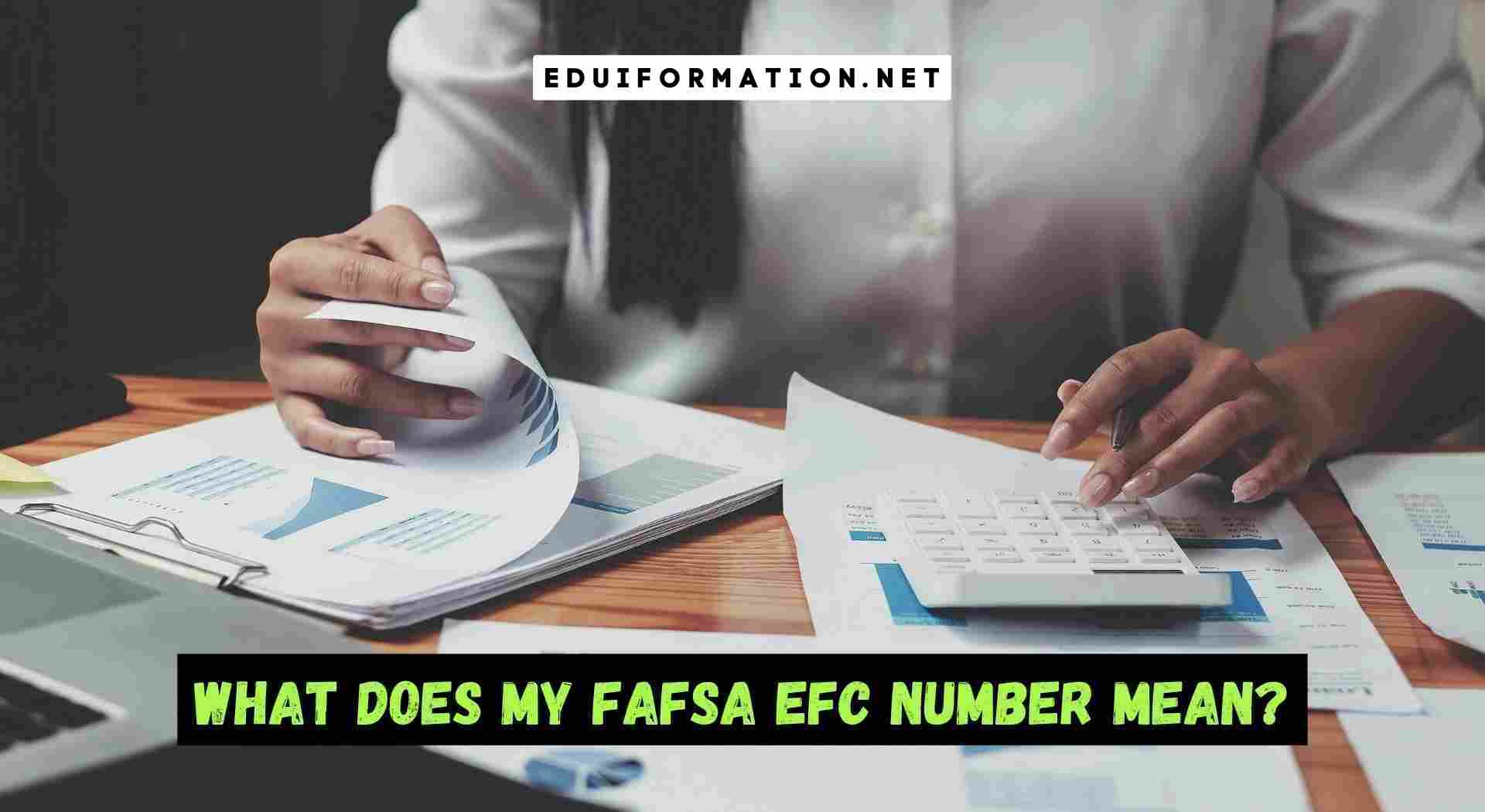Your fafsa efc number is a financial aid indicator that represents your expected family contribution. It helps determine the amount of aid you are eligible to receive for college expenses.
Applying for financial aid can be overwhelming, but understanding your fafsa efc number is crucial. The fafsa (free application for federal student aid) efc number is a figure that represents the amount your family is expected to contribute toward your education expenses.
This number is calculated based on various factors such as income, assets, and family size. It helps colleges and universities assess your financial need and determine the amount of aid you may qualify for, including grants, scholarships, and loans. The lower your efc number, the higher your aid eligibility.
This makes it important to accurately complete your fafsa application to ensure an accurate efc calculation. By understanding your fafsa efc number, you can better plan for your educational expenses and explore available financial aid options.
How Is The Fafsa Efc Number Calculated?

The fafsa efc number is a calculation that determines your eligibility for federal financial aid. It takes into account various factors such as income, assets, family size, and other variables. These factors play a significant role in influencing your efc number.
By evaluating your financial situation and these factors, the efc number provides an estimate of how much your family can contribute towards your education expenses. It is important to understand that the efc number is not necessarily the amount of financial aid you will receive, but rather a measure of your financial need.
The lower your efc number, the higher your financial need, and the more likely you are to receive financial aid. So, by understanding how the fafsa efc number is calculated and the factors involved, you can better prepare for your college financial planning.
Efc Number Vs. Cost Of Attendance
The efc number is a key factor in understanding the cost of attending college. It represents the expected family contribution, which is the amount of money the federal government determines that a family can afford to contribute toward college expenses.
The relationship between the efc number and the cost of attendance is important to consider when managing college expenses. By understanding your efc number, you can make informed decisions about financial aid options and scholarships that can help offset the cost.
Exploring different methods for managing college expenses based on your efc number can help you navigate the financial aspect of higher education and ensure you’re making the most cost-effective choices.
Tips For Optimizing The Fafsa Efc Number

Understanding your fafsa efc number is essential for maximizing your financial aid opportunities. By optimizing this number, you can potentially reduce your expected family contribution (efc). To do so, consider these tips. Firstly, ensure that all information provided on your fafsa is accurate and up-to-date.
Next, strategically position your assets to minimize their impact on your efc calculation. Additionally, take advantage of any available deductions or credits that can lower your overall efc number. It is also beneficial to communicate with the financial aid office at your institution to explore potential waivers or special circumstances that may be considered.
By implementing these strategies, you can potentially reduce your efc number and increase your chances of receiving more financial aid. Remember, understanding and optimizing your fafsa efc number is crucial for securing the best financial aid package for your education.
Frequently Asked Questions For What Does My Fafsa Efc Number Mean?
What Does A Low Fafsa Efc Number Mean?
A low fafsa efc number means that a student is likely to have higher eligibility for need-based financial aid. This means they may qualify for larger grants, scholarships, or subsidized loans. It indicates that the student and their family have a lower ability to contribute towards their education expenses.
Can I Appeal My Fafsa Efc Number?
Yes, you can appeal your fafsa efc number if there have been significant changes to your financial situation that are not reflected in the information provided on the fafsa. You will need to contact the financial aid office at your chosen college or university to initiate the appeals process.
What If My Fafsa Efc Number Is Higher Than I Expected?
If your fafsa efc number is higher than expected, it means that you may have a higher expected contribution towards your education expenses. This could impact the amount of need-based financial aid you qualify for. However, there are other forms of financial aid available, such as scholarships or private loans, that you can explore to help cover the remaining cost.
Conclusion
Understanding your fafsa efc number can provide valuable insight into your eligibility for financial aid. By calculating your expected family contribution, or efc, the fafsa determines how much aid you may be eligible to receive. Whether your number is high or low, it’s essential to grasp what it means for your financial situation.
A high efc typically indicates that you may be expected to contribute more towards your education expenses, potentially reducing your eligibility for need-based aid. However, it’s essential to explore other avenues, such as scholarships or grants, to help offset these costs.
On the other hand, a low efc could mean you are eligible for a greater amount of need-based financial aid. It’s crucial to thoroughly review your financial aid package and understand how your efc number factors into the equation. Remember, your fafsa efc number serves as a starting point for financial aid discussions.
Make sure to research and explore all available options to maximize your aid package and make your higher education dreams a reality.

